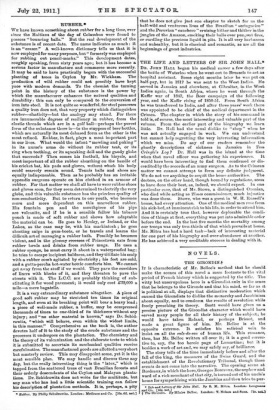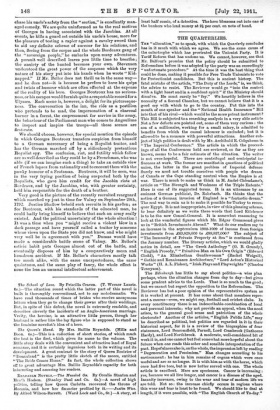NOVELS.
THE GIRONDIN.t IT is characteristic of Mr. Belloe's method that he should make the scenes of this novel a mere footnote to the vital period of French history which is suggested by the title. The witty but unscrupulous hero is a Girondist only in the sense that he belongs to the Gironde and that his mind, so far as it is political at all, displays that distinctive moderation which caused the Girondists to dislike the monarchy and Jacobinisin about equally, and to condemn the results of revolution while freely preaching its theory. Scott would have given us a precise picture of the Girondist character which would have served many people for all their history of the subject; he would have taken Roland, or perhaps Brissot, and made a great figure of him. Mr. Bello() is at the opposite extreme. It satisfies his satirical vein to insist on all the cuts-de-sae of human life. This romance, then, has Mr. Belloc written all over it ; it is a good correc- tive to, say, the too heroic page of Lamartine ; but it is besides a work of art and, we may safely say, of brilliance.
The story tells of the time immediately before and after the fall of the king, the massacre of the Swiss Guard, and the establishment of the Revolutionary Tribunal, though these events do not come into the narrative. The opening scene at Bordeaux,in which the hero, Georges Boutroux, the nephew and ward of a rich merchant of that city, is turned out of his uncle's house for sympathizing with the Jacobites and then tries to pur-
• lee mut Lotter. of file John Hall. By S. M. 7ditra. London: Longman and Co. [16a.
t The Gfrondin. By Hilaire Be:loc. London: T. Welton and Sour. rs. iota chase his uncle's safety from the "section," is excellently man- aged comedy. We are quite uninformed as to the real motives of Georges in having associated with the Jacobins. At all events, he kills a guard set outside his uncle's house, more for the pleasure of testing a rapier against a cavalry sword than to aid any definite scheme of succour for his relations, and then, fleeing from the corpse and the whole Bordeaux gang of the "sovereign people," he embarks upon many adventures. A pursuit well described leaves you little time to breathe ; the anxiety of the hunted becomes your own. Stevenson understood the great power of the suspense which the very nature of his story put into his bands when he wrote "Kid- napped." If Mr. Belloc does not thrill us in the same way— and he does not—it is because he prefers to have his quips and twists of humour which are often effected at the expense of the reality of his hero. Georges Boutroux has no serious- ness, or his escapes would furnish quite a respectable record for a Ulysses. Each scene is, however, a delight for its picturesque- ness. The conversation in the inn, the ride as a postilion who pretends to be mad, the impersonation of a charcoal burner in a forest, the empressment for service in the army, the behaviour of the Parliament man who comes to Angouleme to inspect and inspire the troops—all these scenes are first-rate.
We should choose, however, for special mention the episode in which Georges Boutroux transfers suspicion from himself to a German mercenary of being a Royalist traitor, and has the German marched off by a ridiculously pretentious Royalist spy. The confusion, riot, and futility which follow are as well described as they could be by a Frenchman, who was able (if we can imagine such a thing) to take an outside view of French lapses from rationality and to recount them with the pawky humour of a Scotsman. Boutroux, it will be seen, was in the very trying position of being suspected both by the Royalists, who gave him credit for the Jacobin riots at Bordeaux, and by the Jacobins, who, with greater certainty, held him responsible for the death of a brother.
Very good is the picture of the recently recruited rearguard which marched up just in time for Valmy on September 20th, 1792. Justice Shallow beheld such recruits in his garden; as for Boutroux, with his standards of the educated man, he could hadly bring himself to believe that such an army really existed. And the political uncertainty of the whole situation ! It was a time when you "might receive a violent blow in a dark passage and have yourself called a traitor by someone whose views upon the State you did not know, and who might very well be in agreement with you." Dumas would have made a considerable battle scene of Valmy. Mr. Belloc's satiric habit puts Georges almost out of the battle, and eventually disposes of him by a comparatively mean and humdrum accident. If Mr. Belloc's characters mostly talk too much alike, with the same unexpectedness, the same quaintness, and the same play of fancy, the whole effect is none the less an unusual intellectual achievement.







































 Previous page
Previous page